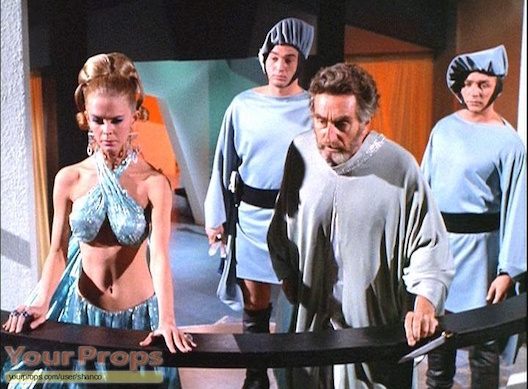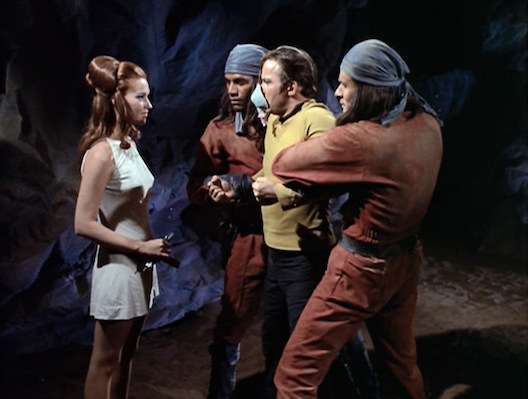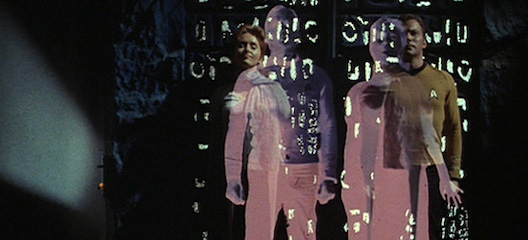-Blofeld
Watch the second Bond film, ’From Russia With Love’ (1963), and two things will not fail to strike you. The film’s tension is supplied by Spectre, and their playing Cold War antagonists against one other, causing events to fizzle and crackle unpredictably. Yet at the same time they shows every sign of having been inserted into an existing story.
Elementary research reveals yes, Fleming’s novel hadn’t originally involved them. They didn’t arrive until his ninth book, ‘Thunderball’, in 1960. And were then mentioned only passingly in the tenth, ‘The Spy Who Loved Me’. Whereas Spectre fill the films, being introduced from the first, ‘Dr. No’ in 1962. (Though admittedly seeded might be a better term, as the info plays little plot function.) Unlike the books the films never went for a purely Cold War plotline. Even the non-Spectre stories feature rogue capitalists, such as ‘Goldfinger’ (1964).
Interestingly, in ‘From Russia’ their existence is not revealed to Bond until near the end but spelt out to us viewers from the start. This may be for clarity, keeping us up to speed on some otherwise convoluted plot lines. But it also suggests impatience, an eagerness to get to them and their cat-stroking supremo as soon as possible.
And it worked! You always know when something’s truly cemented in the popular consciousness, because it’s what all the parodies swipe at. And so it is here, with Dr Evil in ‘Austin Powers’ and all the rest.
More elementary research suggests Fleming devised them precisely not to limit himself to the Cold War. But the Connery films don’t use them like that. Instead they stick to this introductory combination, the hidden third player in a seemingly two handed game. Blofeld’s infamous opening monologue is about the siamese fighting fish who waits until both his opponents are fought to a standstill, then strikes. They need that distraction as cover. So we have stories which require that setting to be told, yet which are not in themselves Cold War tales.
They next appear in ‘Thunderball’ (1965). In the by-now-standard set-up scene, Bond goes to see M in his office. Which is fairly plush, as offices go. But this time he’s told to instead attend the conference room. Which is still more grand, ornate and traditionalist, adorned with tapestries. The intra-story explanation is that thsi time Spectre’s plot is so big that all the double-O agents must be briefed at once, hence booking the bigger room.
But this is clearly more to do with creating a visual contrast with what we’ve just seen - Spectre set around a conference table in a sleekly modernist open-plan office. When an underling’s bumped off, like they always are, their chair sinks smoothly into the ground - efficient, mechanised murder.
Connery’s fourth outing, ‘You Only Live Twice’ (1967), essentially jettisoned the novel wholesale to reprise the plot of ‘Dr. No’ on steroids. Everything happens again, just on a grander scale; instead of just disrupting rockets Spectre are now snatching them, hence their need for a bigger base, and so on. Yet this scaling up is such that it makes a substantive difference. That famous opening scene of their rocket swallowing the American one up whole, it seems as much an iconic moment as Blofeld before his bank of buttons.
There were many unashamed Bond cash-ins, including Marvel’s ‘Nick Fury Agent of Shield’ comics (starting 1965). Where Hydra were such a clone of Spectre they unashamedly sported a near-identical skull octopus logo. (Meaning, of course, many limbs, one mastermind.) But they’re a riff on more regular phobias, a cobbling together of Nazi Germany and the Soviet Union, represented the familiar way as the evils of collectivism. (Their mantra is “Cut off a limb and two more shall take its place”.)
But the real point of comparison might be the 1967 Avengers episode ‘The Fear Merchants’. Much like Blofeld, the Business Efficiency Bureau are initially faceless. With their minimalist-look, automated offices, with their gloved hands, their permanent sunglasses and clipped intonation they represent predatory capitalism, ruthlessly striking out the traditional, rather paternalistic corporations around them. They’re probably best read as the escaped shadow of businessman Mr. Raven who hires them, so to them terms like “eliminate the competition” are to be taken literally. Their efficiency fixation becomes a kind of dispassionate pathology.
Why should all this be? Why should spy-fi be the genre which looked beyond the day’s standard West/East antagonisms? In the best spy story tradition, there’s clues…
The introduction-to-Spectre scene takes place not in a fixed place, but aboard a yacht. Then in ‘Thunderball’, in a change to the book which reinforces this theme, their front group is the International Brotherhood of Stateless Persons. In ‘You Only Live Twice’, this becomes a corporation, Osato Chemicals. So the motif of Spectre lying quite literally behind transnational organisations, through hidden doors and so on, becomes established.
Because Spectre stand for the post-war growth of corporate power, the free market unconstrained. If Hydra represent too much conformity they’re an excess of individuality. Those modernist offices signify their ruthlessly non-rules-based competitivism, hire-and-fire politics taken to their limit. (“This organisation does not tolerate failure.”) That rapacious rocket, devouring those of nation-states, is a perfect visual metaphor for this.
Corporations, it is true, did not suddenly appear in the Sixties alongside mini skirts. But social and economic processes are normally remorselessly slow, changes which culture then tries to capture by transforming them into events. It becomes like trying to demonstrate climate change using the day’s weather map. And the Sixties were a point where their rise was starting to feel inexorable. Encyclopedia.com comments:
“Despite prosperity, major shifts were occurring in American business and the workforce. Pre-existing corporations were merging and becoming larger, more powerful conglomerates. Consumers increasingly were doing their shopping at discount chain stores and their dining at inexpensive fast-food restaurants, leading to a decrease in the number of single-proprietor businesses.”
And if Britain was a step behind America in these shifts, that only meant they were felt more acutely. The 1965 spy film ‘The Ipcress File’ rather pointedly set a scene in the gleam of a then-very-modern supermarket, with one arch-Brit commenting distrustfully of “American shopping methods.”
And just like the British delegation in the opening of ‘You Only Live Twice’, literally placed between the Cold War enemies and consequently able to see outside their ideological blinkers, Britain’s economic model was more mixed. A much larger public sector covered most basic amenities. So corporations somehow seemed simultaneously inevitable, international and foreign. To this day British people tend to treat ‘American’ and ‘transnational’ as almost interchangeable terms.
Let’s try to focus on something that can be hidden by familiarity. Why the with-holding of Blofeld’s face? There’s never any suggestion this is a whodunnit question, where he’ll turn out to be some previously seen character. And arguably this anonymity of evil starts before he is even introduced. In ‘Dr. No’, Professor Dent goes to No’s island lair to warn him of Bond’s snooping. Yet despite his making this journey he only gets to hear his boss’s booming, disembodied voice, ‘Wizard of Oz’ style. Again there’s an intra-story reason for this. No’s displeased with him running to the island against instructions, and keen to spell this out. And of course this facelessness is mood-inducing, creating a sense of menace. But there’s more…
Corporations responded to public suspicions by investing heavily in public relations, with some even suggesting they invented the industry. Wikipedia states: “Public relations was founded, in part, to defend corporate interests against sensational and hyper-critical news articles. It was also influential in promoting consumerism after the emergence of mass production.”
They not only lobbied be seen as people, in the legal concept of ‘corporate personhood’, but also to project likeable, trustworthy personalities for themselves. And, before such advertising-agency methods came to be used in electioneering, this seemed much more a corporate tool. The sinisterly shadow-hugging Blofeld is a counter to this project of open-facedness and service encounter smiles.
With the next entry, ‘On Her Majesty’s Secret Service’ (1969) Blofeld kept enough accoutrements about him to be recognisable (a baldy with a white cat and so on) but was so re-written he was effectively a different character. He’d been a remote, controlling head of a criminal empire, who didn’t just despatch minions to fight Bond, but despatched minions in order to themselves despatch minions. Here, deprived of the formula role of the rough, touch henchman, he does the final-reel fisticuffs himself.
And his motives have become personalised, and with them humanised - he’s after a pardon and a hereditary title. All of which was underlined by his being played by Telly Savalis, quite a contrast to Donald Pleasence’s “maybe-too-calm” demeanour and understated menace.
With the next entry, ‘On Her Majesty’s Secret Service’ (1969) Blofeld kept enough accoutrements about him to be recognisable (a baldy with a white cat and so on) but was so re-written he was effectively a different character. He’d been a remote, controlling head of a criminal empire, who didn’t just despatch minions to fight Bond, but despatched minions in order to themselves despatch minions. Here, deprived of the formula role of the rough, touch henchman, he does the final-reel fisticuffs himself.
And his motives have become personalised, and with them humanised - he’s after a pardon and a hereditary title. All of which was underlined by his being played by Telly Savalis, quite a contrast to Donald Pleasence’s “maybe-too-calm” demeanour and understated menace.
‘Diamonds Are Forever’ (1971) is generally seen as a return to formula after a one-off experiment. And indeed Blofeld’s plot is the now-familiar one of blackmailing the superpowers, using a genuine corporation as cover. The ante is again upped, this time they’re not a willing front. The Whyte Corporation suffers a rather literal hostile takeover, with Blofeld kidnapping and then impersonating its head. Whyte and Blofeld are never shown within the same frame, allowing for some id/ego comparisons.
But there’s no mention of Cold War antagonisms, and with them no mention of Spectre. Rather than a succession of underlings, Blofeld has an array of distracting doubles. And he’s more the attention-seeking megalomaniac of the last film, his motives virtually reducing to getting world leaders to return his calls. As he becomes Bond’s personal arch-enemy, with the pre-credit sequence devoted to 007’s attempts to hunt him down, he becomes personalised.
If the world didn’t hear from Spectre again until 2015, the immediate cause was rights issues. However, as by that point everything that had made them unique had dissipated, it felt a mercy killing. Were they such a creature of Sixties Cold War culture that even 1969 proved too late for them? Or had ‘Live Twice’ done it’s job too well, leaving Spectre with no more road to travel?
Alternately, it may be less to do with outside events and more with tactical errors. Blofeld shows his face in the finale to ‘Live Twice’ and it’s notable how quickly his sinister effectiveness dissipates from there. Perhaps, much like the initially unseen Corporation in the Alien films, it was a mistake which had no undo button. Perhaps the formula should have been more like ‘The Prisoner’, a successive array of No. 2s working to the bidding of some malign No. 1 teasingly kept forever off-stage.
So if corporations are the bad guys, does this make the Bond films anti-capitalist? Well, they were themselves distributed by a corporation, United Artists, and quickly became a byword for blatant product placement. (To the degree that the later instalment ‘Die Another Day’ was soon dubbed ‘Buy Another Day’.) So signs point to no. What, then, might be going on?
‘Diamonds’ might give us a clue. Willard Whyte runs his operations from a penthouse suite dubbed the Whyte House. And it’s explicitly stated that he’s more powerful than the President, that cops do his bidding and so on. Yet the film’s assumption is that this is only a problem when Blofeld’s usurped his commanding chair.
Perhaps the public weren’t opposed to corporations so much as conflicted about them. In the Encyclopedia quote above, the key word may be the very first - “despite”. Few in Britain, if any, wanted to go back to post-war austerity, with its ration book constraints. But this new abundance seemed to come at a social price, even as actual prices fell. We’ve seen society similarly conflicted over the power of the tech giants in recent years.
So the spectre of Spectre raises popular anxieties about corporations, in order to dispel them. It takes on their downside with none of the upsides, in order to separate the two. What couldn’t happen in reality could at least be brought about through reassuring symbolism. With each film Spectre initially seemed all-powerful, but their scheming was always scuppered by the end.
As corporations grew too big for the constraints of state power, Bond embodies the fantasy of state agents still somehow holding them in check. In this way the Bond films are themselves are part of the public relations industry, canvassing audiences then tailored its products to their dreams and desires, however contradictory.
And Bond himself is part of the old world, a Cambridge-educated toff who knows such social niceties as which wine to order. But he’s also shown as just Spectre enough to fight them at their own brute game. Rather than beset by this conflict, he’s shown as powered by his ability to straddle it. (Something which could also be said of Steed and Mrs. Peel.) The familiar image, from ‘Goldfinger’, of the smart white suit inside the frogman’s outfit exemplifies this double nature.
The 00 agents follow a number code, just Like Spectre. Bond’s relations with M are fractious, and he’s in perpetual conflict with Q, his rulebook-bound straight man who makes perpetual attempts to persuade him to take care of government property. While M’s office and Q’s lab are frequent locations we only see Bond’s own office once, in ‘Secret Service’, after he’s officially resigned. He’s in but not of the establishment.
Spectre use predators (tarantulas, sharks, piranhas and so on) as weapons but also as emblems. And Bond is clearly a predator set to catch predators. His actions are ruthlessly rogueish, rather than conventionally heroic. He’s gentleman and cad in one. (Audiences of the day may well have glossed over his frequent mistreating of women. But at one point he even kicks a cat!)
And, proving this was the way to go, Hydra did eventually catch up with the free enterprise model. The ‘Agents of SHIELD’ TV series included the episode ‘Making Friends and Influencing People’ (2014) where Agent Simmonds infiltrates Hydra. It opens with her as another chic metropolitan commuting to the office, coffee, bagels and log-ons, culminating with a pan to the Hydra logo on the wall. Those evil, scheming corporations. They’re not shadowy or otherly. They’re your day job.



























